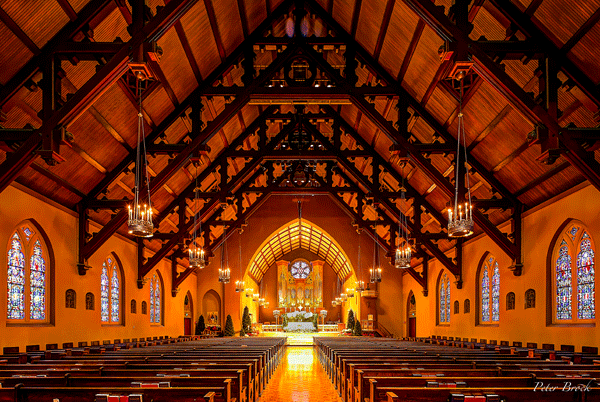Dear Sara,
I didn’t plan on going to church last weekend. It sort of just happened.
I hadn’t been in a very long time, and during my most recent visit I was only barely present. Participation in the service felt a bit like an act of treason. I’d read Pagan writers who said as much. And they must have made an impression on me, because I didn’t engage at all. I just sat and watched the Christians give themselves over to the liturgy, to the songs, and to God as though all of it was foreign to me; as though it wasn’t foundational to my spiritual identity.
But it is. And when I went to church last weekend I didn’t try to pretend otherwise. I was all in. No reservations. It didn’t matter if I didn’t believe every aspect of church doctrine. It didn’t matter to me if I took issue with the gender language. It didn’t matter if I was the only Pagan in the pews. I chose not to focus on any of that. I surrendered myself to the moment…
…and it was beautiful.

I’m not sure what changed in me that made me open to this experience. I just woke up and wanted to go. I wanted to see what it felt like, and whether it would mean anything to me. Would I — a man who’s been a very vocal Pagan in recent years, who’s tried (somewhat unsuccessfully) to adopt a polytheist theology, who’s worked to build community for other Pagans, to create a space for dialogue about Pagan issues — feel like a foreigner in church? Was there any part of me that would still feel at home in that environment?
I stopped going to church because the politics were ugly, and I was bothered by how small everyone made God out to be. If God was worth his salt, then she was beyond what anyone could imagine. God was a mystery. God was even greater than he was written about in Scripture. She was beyond all comprehension, which, itself, is an idea beyond comprehension. The Church made God small and petty, when it is really people who are small and petty.
You wrote,
“I believe spiritual journeys are wildly complex creatures. They are not linear, they do not make logical sense – they loop back on themselves and contradict themselves. So if this is a moment that passes away for you and you find yourself 100% (or as much as anyone can say that) Pagan, that is legit, and if you find yourself returning to the church and identifying as 100% (again, as much as anyone can) Christian, that is legit, and if you remain in a strange fluctuating inbetween world where you are both and sometimes more and sometimes less, etc, that is legit too. Our cultural worldview doesn’t tends to affirm this.”
I think you’re right. But I find myself stuck on this idea that by having a meaningful experience in church, or by opening myself up to discussions about Jesus or his teachings (something that’s been more or less off limits in my household over the past few years) that I might no longer be Pagan. I feel like I am, and yet I cannot deny how resonant it was to me to be in that service, to sing those songs, to take the Eucharist.
A part of me wants my religious identity or my spiritual inklings to make logical sense. Binary thought is popular for a reason: it takes away a lot of the guess work. You simply are something or you’re not. There are plenty of Christians who see the world that way, and a good handful of Pagans, too.
But when it comes down to it, I don’t think I’m like that. I keep finding myself in the “inbetween world”; never either/or, but always somehow both/and.
It’s an act of faith to think that’s legit.
So I’m going to church tomorrow again. And afterward I’ll start making plans for my Samhain ritual.
Do you ever wonder how it is that you can worship nature, or be an animist, and also be a follower of Christ? How do you hold the tension between the parts of yourself that are seemingly at odds with one another? Are they at odds, or are you just chasing the Spirit wherever it leads you?
I eagerly await your reply.
In peace,
Teo